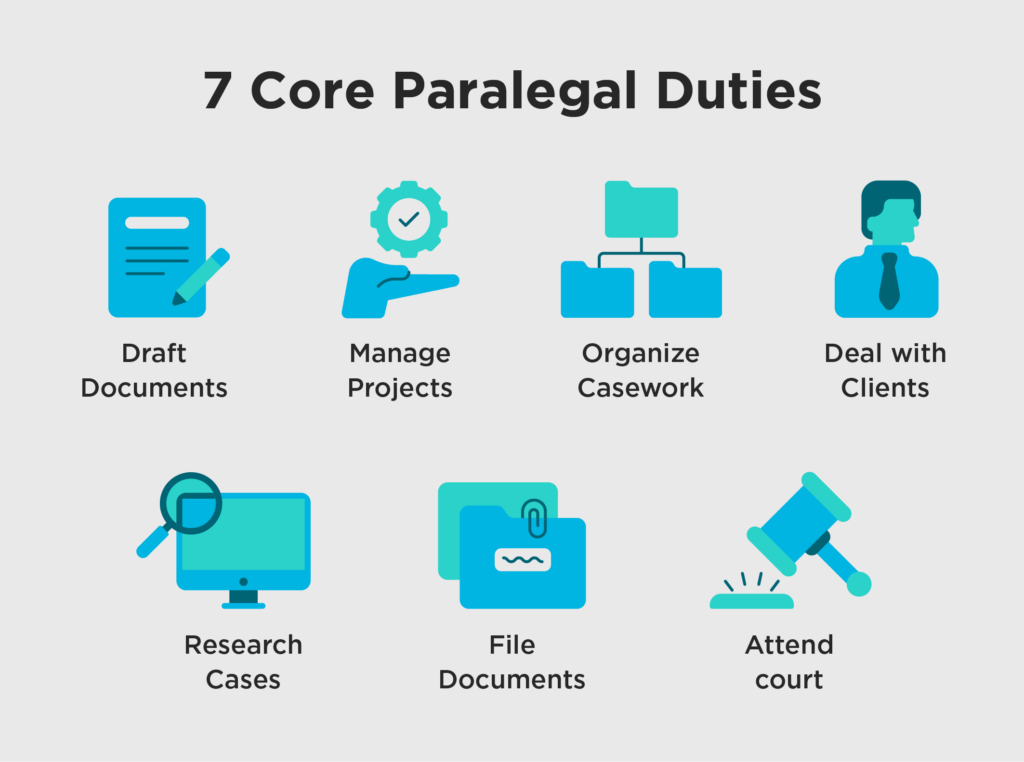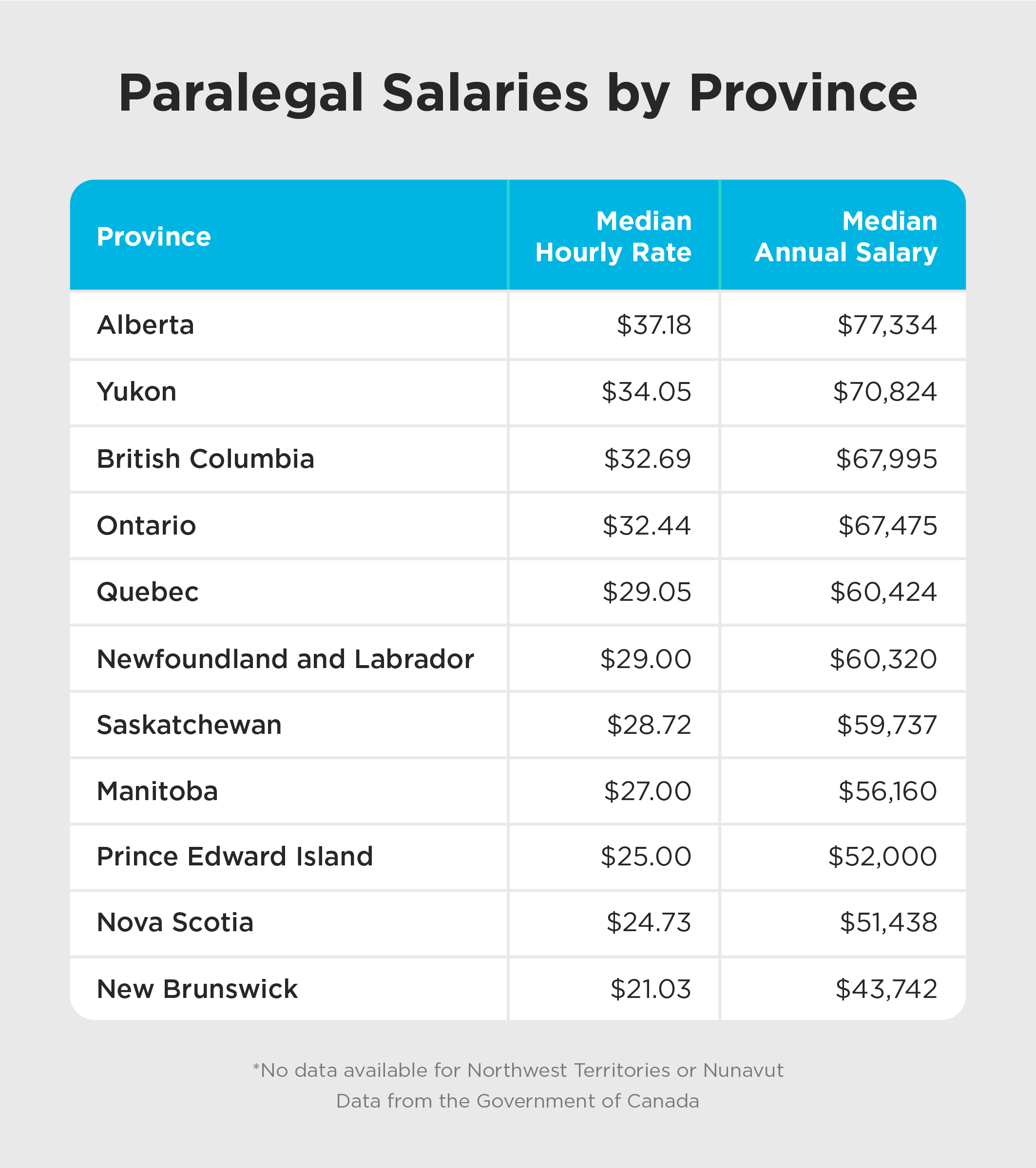What Does a Paralegal Do in Canada? [Duties, Skills + Salary]

quick answer
Paralegals are professionals who can work for corporations, law offices, and other legal settings. They conduct legal research, draft legal documents, interview people, and more. Lawyers depend on Paralegals to prepare casework, assist them during trials, and perform other important duties.
In This Article
Lawyers can’t do everything alone. That’s where Paralegals come in.
Paralegals do exciting, dynamic, and interesting work every day. Their career prospects are strong in Canada, with many growth opportunities. In fact, there will be as many as 18,900 Paralegal job openings across Canada in the next seven years.
Paralegals are professionals who are educated in Canadian Law and can perform important law work. They can work for corporations, law offices, and other legal settings. Paralegals are skilled in legal research, document drafting, interviewing, and advocacy.
So, what does a Paralegal do? While all Paralegals in Canada perform similar work, there are unique restrictions nationwide. Each province has its standards of practice for legal professionals, such as standards for giving legal advice. Currently, the only province with an official Paralegal regulatory board is Ontario.
Although the main duties are the same across the country, we will note a few important provincial differences. Keep reading to learn exactly what to expect as a Paralegal.

The main duties of Paralegals are the same for all provinces. Paralegals do not practice law but are highly educated in Canadian and provincial law. Under the supervision of a Lawyer, Paralegals can perform a wide range of tasks.
Paralegals conduct research, draft legal documents, interview clients, correspond with opposing counsel, and develop case theories. Rather than performing the important administrative duties of a Legal Assistant, the Paralegal works directly with and on behalf of a Lawyer.
Key Paralegal duties include:
In specific situations, Paralegals may perform duties outside the typical boundaries. A lot of grey area depends on the province, case, and if they receive payment. For example, “Non-Lawyers” in Manitoba may give legal advice without payment.
With so many fine details, it’s a good idea for professionals to join a Paralegal association. These associations grant members access to a professional network, valuable resources, and other perks. You can join the national Canadian Association of Paralegals (CAP) or one of the many provincial associations.
A Paralegal education with qualified professionals can also help you understand provincial law. Recognized business programs can give students essential knowledge, experience, and job skills.
After earning their post-secondary education as a Paralegal, many professionals specialize in specific areas of law. There are many types of law, meaning there are many types of Paralegals. Common types of Canadian Paralegal include:
Every type of law comes with its unique processes and documents. There’s plenty of exciting work in interesting legal environments. You need to learn the fundamentals and get real job experience to get into these specialized fields.
The Paralegal profession can be a high-paying job in Canada. How much Paralegals earn depends on their qualifications, experience, employer, and province. To put this into perspective, the average salary of a Canadian Paralegal is $59,997. For those who advance to Senior Paralegals, the average Canadian salary is $85,255.

Paralegals don’t officially need specific education outside of Ontario, where you’re required to get a Certificate through an accredited Paralegal Education Program. Still it can make a big difference in your career. You can stand out to hiring committees with an education that proves your legal knowledge. Programs can also provide real-world job experience that can help you get hired.
Paralegals are the ultimate sidekick to Lawyers. Their work is detail-oriented, complicated, and time-sensitive. Let’s take a look at the top skills for Paralegals in Canada.
Legal offices manage complicated work that can greatly impact their business and clients. Paralegals need to retrieve information at a moment’s notice, so organization is key. Legal work is often time-sensitive, and Paralegals are skilled at managing this effectively.
Paralegals use organizational skills to:
With so many things to organize, Paralegals need excellent technological skills.
Paralegals are skilled in software like Microsoft Office. This is essential for organizing cases, billing, managing calendars, drafting documents, and other internal work.
They can also use industry software and information systems that most people cannot access. They know how to upload documents for filing and stamping by provincial courts. For example, Albertan Paralegals know how to use the King’s Bench Filing Digital Service for important casework.
Paralegals are exceptional professional communicators. They can speak to Lawyers, clients, and opposing counsel daily. Knowing how to communicate in different contexts is a key skill for this line of work.
During important interviews, a Paralegal must ask questions effectively and without leading the interviewee. They also need to communicate and deal with opposing counsel professionally. Paralegals combine their communication skills with legal knowledge to achieve all of this.
Ultimately, Paralegals need to be knowledgeable in Canadian law. Their basic legal vocabulary helps them work in legal offices. They can also manage cases, draft documents, and perform research.
Paralegals also understand important legal processes like litigation. They know what damages are available through litigation depending on the particular case. This helps them assist the Lawyer in:
Entry-level positions require Paralegals to have a broad understanding of the law. More specific roles will require knowledge of Real Estate Law, Family Law, and other specialized disciplines. Paralegals also have advanced knowledge of provincial laws, depending on where they live and work.
The biggest difference between a Law Clerk and a Paralegal is their training. The duties of a Paralegal and Law Clerk can be quite similar, handling things like paperwork and research. However, Law Clerks will often work in the court system rather than at a law firm. Here are the main differences between a Paralegal and a Law Clerk:
Who they report to: Paralegals report to a Lawyer, while Law Clerks usually work under the supervision of a Judge.

No matter what province you are in, all Paralegals must have some education and experience. There is no national regulatory board, and Ontario is the only province where you need a Certificate. So, the basic steps will apply to every province. Let’s dive in!
You have what it takes to become a Paralegal. Take your time, follow the steps above, and research opportunities. This is a great career path for people in any province.
There are lots of interesting aspects to this dynamic career. So, we have a few things left to discuss. Let’s take a look at some of the most popular Paralegal questions.
Paralegals assist Lawyers by performing research, processing legal evidence, drafting documents, and communicating with clients and opposing counsel. Lawyers have the legal authority to approve legal documents, represent clients, and give legal advice.
In most cases, Paralegals are not allowed to represent clients or give legal advice. Independent paralegals may provide legal services within certain limits as the province deems. Every province has its standards, but Paralegals generally work under the supervision of a Lawyer.
Paralegals frequently go to court as part of their job. Paralegals can organize and retrieve documents, discuss the case, and assist the Lawyer.
In most cases, Paralegals do not represent clients in court. There are some grey areas and exceptions for pro-bono services in certain provinces. For example, Independent Paralegals in Nova Scotia can represent clients for basic things like small claims court.
Each province in Canada has specific guidelines on whether Paralegals may give legal advice. Some provinces allow Paralegals to advise under the supervision of a Lawyer or for free. Other provinces don’t allow non-lawyers to provide legal services, including giving legal advice.
Below is a summary of where Paralegals may give legal advice, based on government data:
There is no national regulatory board for Canadian Paralegals, and Ontario is the only province with an official license. Many provinces want an official Paralegal credential to define the role and create more opportunities. This includes legal organizations in British Columbia, Alberta, Saskatchewan, Manitoba, and Nova Scotia.
This is good news for hopeful professionals — an official credential can improve careers. With the current grey areas for what duties Paralegals can perform, an official regulatory board will define these duties explicitly.
A Paralegal Manager makes the most money. They manage a department of Paralegals and are required to have a Bachelor’s Degree in most workplaces. A Paralegal Manager can make more than $100,000 a year.
Corporate Paralegals are employed by corporations to handle legal matters on behalf of the business. They often work within a legal department and report to a licensed Lawyer but have similar responsibilities as a regular Paralegal, such as researching cases, drafting documents, and attending court.
It depends on what you’re interested in. While the responsibilities of a Law Clerk and Paralegal are similar, Law Clerks require a higher level of education and work in the court under a Judge, whereas a Paralegal requires less training and works under a Lawyer.
This is a great career! Paralegals do exciting, dynamic, and interesting work every day. There is also a lot of opportunity for growth, and career prospects are strong in most provinces. Paralegals can also specialize in areas of interest, such as Corporate Law or Family Law.
There is a lot of available career support for Paralegals from provincial associations. For example, the Alberta Association of Professional Paralegals (AAPP) is a non-profit professional association that provides members with continuing education, mentorship, perks, and networking opportunities.
Reach out to Robertson College to learn more about our exciting program for Paralegals in Alberta. We are recognized by the AAPP, and our program can give you the legal knowledge, skills, and job experience you need for a great career.
Kickstart your career with Robertson’s Paralegal Diploma Program today!
In This Article
Once you take the first step, one of our Student Admissions Advisors will get in touch to better understand your goals for the future.
Apply Now